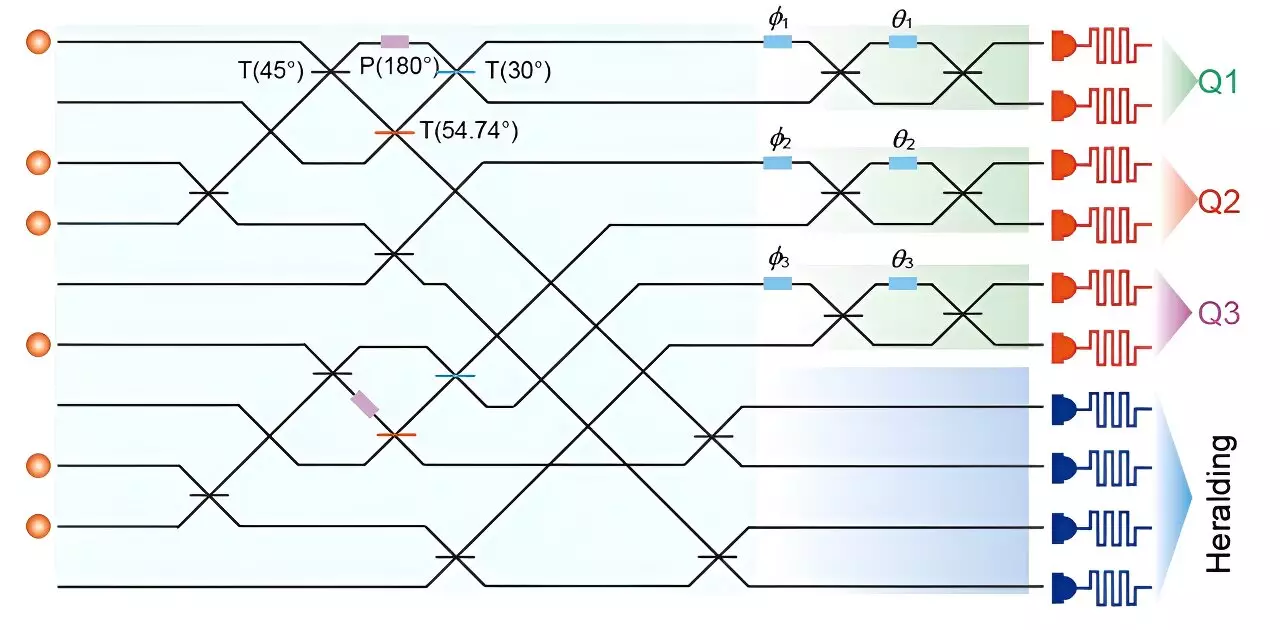

Photonic quantum computers represent a cutting-edge technology in the realm of quantum computing, utilizing particles of light, also known as photons, as the building blocks for information processing. These computers offer the potential for surpassing traditional quantum computers in terms of speed and the transmission of information over longer distances. Despite their promising advantages, photonic quantum computers have yet to achieve the desired outcomes, mainly due to the limited interactions between individual photons.
In a recent publication in Physical Review Letters, researchers from the University of Science and Technology of China introduced a breakthrough in the form of a large cluster state that could enhance quantum computation in photonic systems, specifically three-photon entanglement. This development aims to overcome the obstacles posed by the weak interactions between single photons, a hurdle for implementing deterministic two-qubit gates necessary for scalability.
The study by Wang and his team explores the concepts of fusion and percolation as scalable methods for achieving quantum computation in photonic systems without relying on deterministic entangling gates. By fusing small resource states into large-scale cluster states, such as the 3-GHZ state, the researchers pave the way for measurement-based quantum computing. The percolation theorem establishes that success is attainable if the fusion gate’s success probability surpasses a specific threshold, outlining a framework for generating essential resource states.
Of the two primary methods for generating a 3-GHZ state, the near-deterministic production of entangled clusters in a heralded manner emerges as a promising approach. Through this method, the researchers successfully created the 3-GHZ state from a single-photon source using a photonic chip, marking a significant milestone in realizing fault-tolerant photonic quantum computing. Their experimental setup, involving six single photons injected into a 10-mode interferometer, showcases the utilization of state-of-the-art single-photon sources like InAs/GaAs quantum dots and efficient programmable interferometers.
The recent findings by Wang and his team build upon earlier advancements in heralded single photons and entangled photon pairs, demonstrating the potential for large cluster states in enabling fault-tolerant, measurement-based quantum computing with photonic chips. Furthermore, these developments coincide with related studies published in reputable journals, collectively signaling progress towards the effective realization of fault-tolerant photonic quantum computers. Looking ahead, achieving a fusion gate surpassing the percolation threshold with eight single photons remains a feasible goal, showcasing the continued evolution of photonic quantum computing technologies.
The battle against antimicrobial resistance (AMR) has become one of the paramount public health challenges…
In our relentless pursuit of healthier lifestyles, the craze for sugar alternatives has become a…
As climate change continues to wreak havoc globally, Africa's vulnerability makes it imperative for nations…
The realm of quantum technology has long been hailed as the next frontier in scientific…
The fascination surrounding black holes often breeds misconceptions, particularly the idea that they obliterate not…
In a groundbreaking endeavor, researchers at Trinity College Dublin have merged the worlds of chemistry…
This website uses cookies.